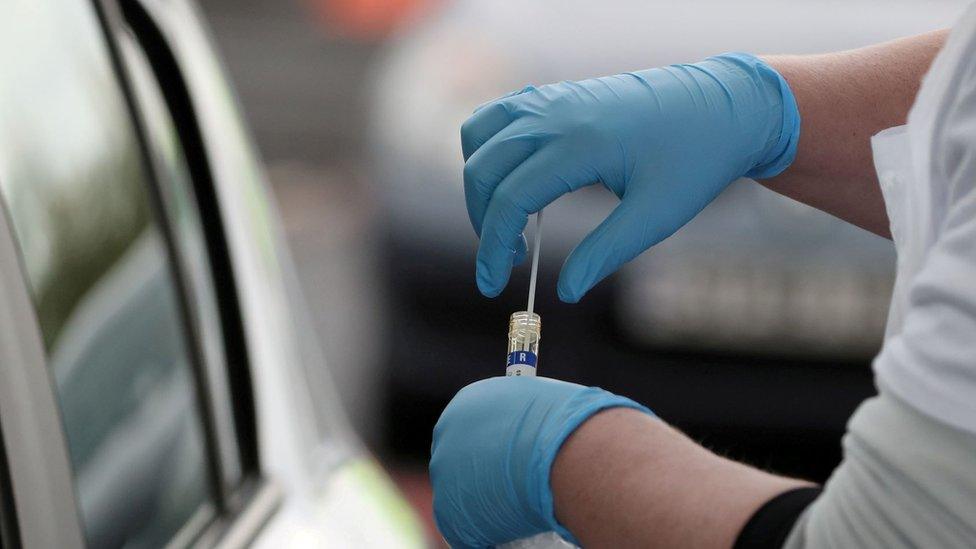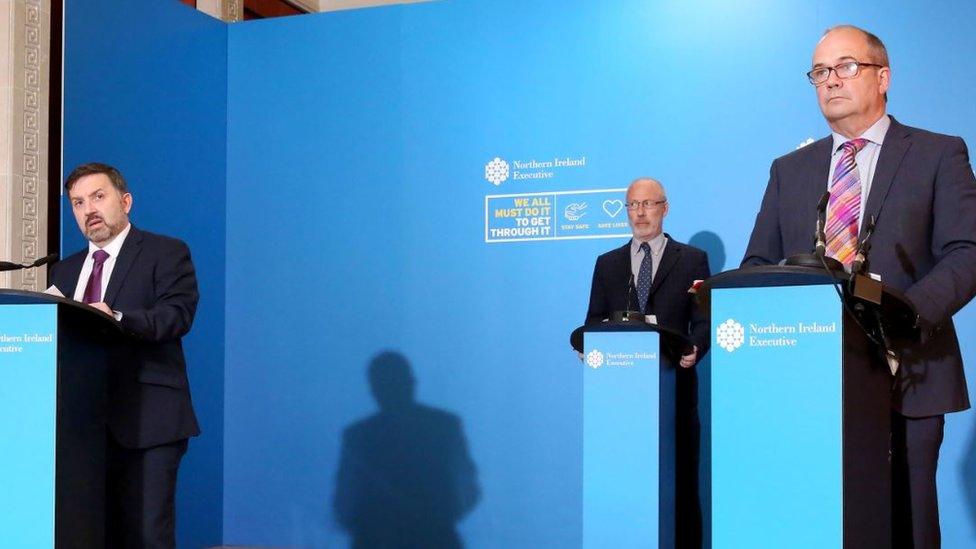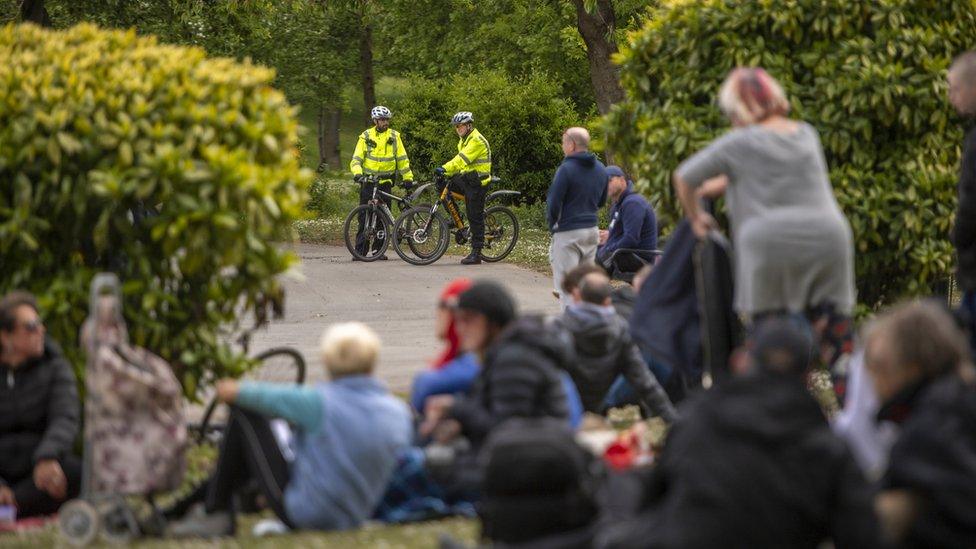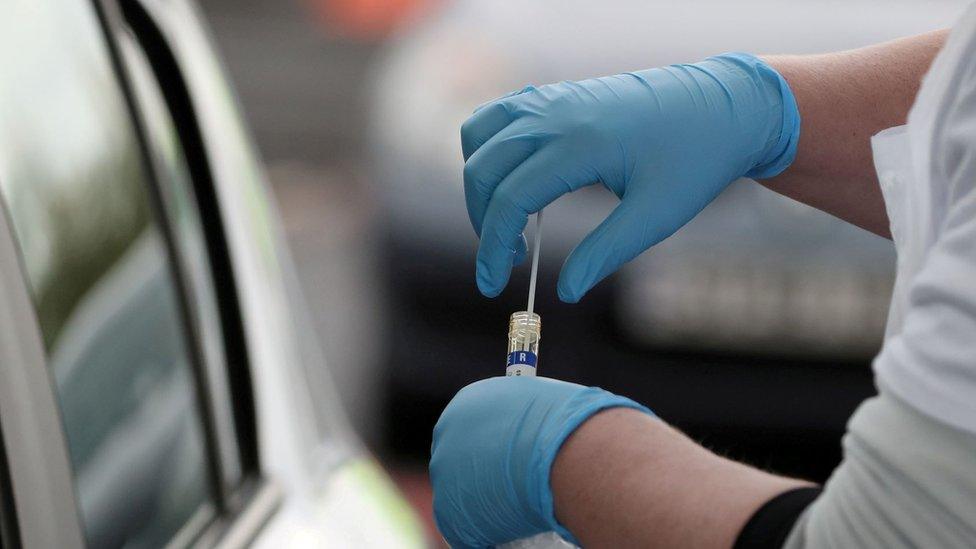Coronavirus: Robin Swann wants Covid-19 rules tightened
- Published

NI's coronavirus case rate per 100,000 population is the highest in the UK
Northern Ireland's health minister has said "concrete action" is now necessary to stop the spread of Covid-19.
Robin Swann said he would recommend the executive tightens restrictions when ministers meet on Thursday.
He said figures suggest "the time has come that we need to introduce measures to limit contacts between people".
He added decisions would be required on whether it would apply to Northern Ireland as a whole or to more localised areas, with higher rates of the virus.
The health minister said he was confident other ministers would agree on the need to take action now, in the hope of avoiding more restrictions at a later date.
Mr Swann told a Stormont press briefing the number of Covid-19 cases in Northern Ireland have been "rising sharply" and "more people of an older age are beginning to test positive".
Northern Ireland's current case rate is 35 per 100,000 people - a figure far above the level at which the UK has imposed quarantine restrictions on other countries, which was a rate in excess of 20 cases per 100,000 people.
"To be blunt, if a foreign country had our figures we would be imposing quarantine on anyone returning from us," Mr Swann said.
'More testing is not the explanation'
Chief scientific officer Prof Ian Young said there was no area of Northern Ireland where the virus had not hit in recent weeks.
The seven-day rolling average number of cases has increased from about four per day at the start of July to more than 90 by the start of this week - a twentyfold increase.

The minister and the two senior health officials delivered a sombre warning on Wednesday
Prof Young said some people attributed this rise to the fact that more tests are being carried out now than compared to early July, but he disagreed.
"The average amount of testing has increased about fivefold, during a period when the number of cases has increased by over twentyfold - increased testing is not the explanation," he said.
At the start of July, less than 0.5% of tests were returning a positive result on a seven-day rolling average basis.
That has now risen to just under 2% of tests, or 1 in 50.
Prof Young said that, at times, the number had been more than 3%.
That clearly indicates, he said, an increase in the epidemic and an increase in community transmission.
'Our position is worse'
Prof Young added that Northern Ireland was experiencing a "substantially greater" number of cases than anywhere else in the UK and Ireland, when looking at infections per 100,000 people.
"Our position is worse than England, Scotland, Wales or the Republic of Ireland at present," he said.
On Wednesday, Northern Ireland's Department of Health said 49 new cases of Covid-19 have been confirmed in the past 24 hours. No new deaths were reported so its toll remains at 567 deaths.
In the Republic of Ireland, three coronavirus-related deaths were reported on Wednesday and 84 new cases of Covid-19 were confirmed. The Republic's death toll is now 1,781.


Health officials in Northern Ireland are considering a range of options which could see changes to the rules around social gatherings, the BBC understands.
Northern Ireland's case rate per 100,000 people is the highest across the UK.
The UK's 14-day cumulative total of cases per 100,000 is approximately 22, while Northern Ireland's is more than 35.
England's figure would have influenced the government's decision to limit social gatherings to six people or fewer, with some exceptions, from Monday.
The fact that Northern Ireland's case rate per 100,000 figure is much higher is bound to influence how the executive decides to act.

Chief medical officer Michael McBride appealed to students to exercise caution, given that many travel home at the weekend.
Asked whether council areas or postcodes might be used to introduce restrictions, the health minister said there would be a "wide discussion" at the executive meeting on Thursday.
There have been several local lockdowns in parts of England and Scotland, when public health officials felt the numbers were reaching a level where action needed to be taken to prevent them getting out of control.
Meanwhile, it emerged on Wednesday that visits have been suspended to a ward at Altnagelvin Hospital in Londonderry.
The Western Trust said the move in Ward 50, which treats vulnerable cancer and haematology patients, was to minimise their risk.
Some visits may be allowed in exceptional circumstances, it added.
It comes after four haematology patients died at Craigavon Area Hospital after testing positive for coronavirus..
- Published9 September 2020

- Published5 September 2020
